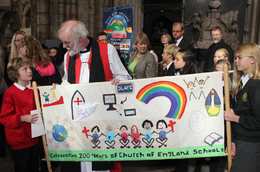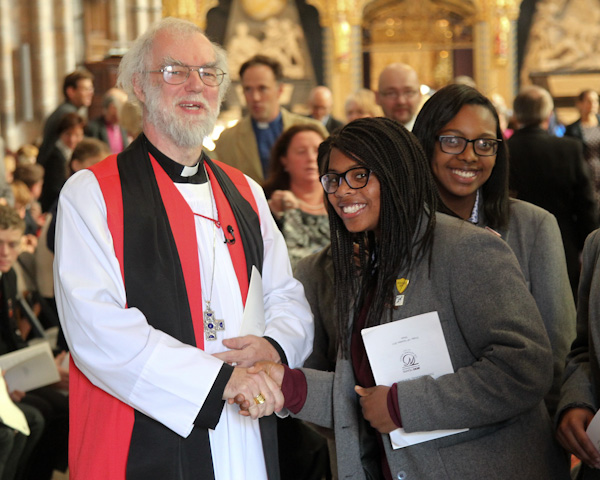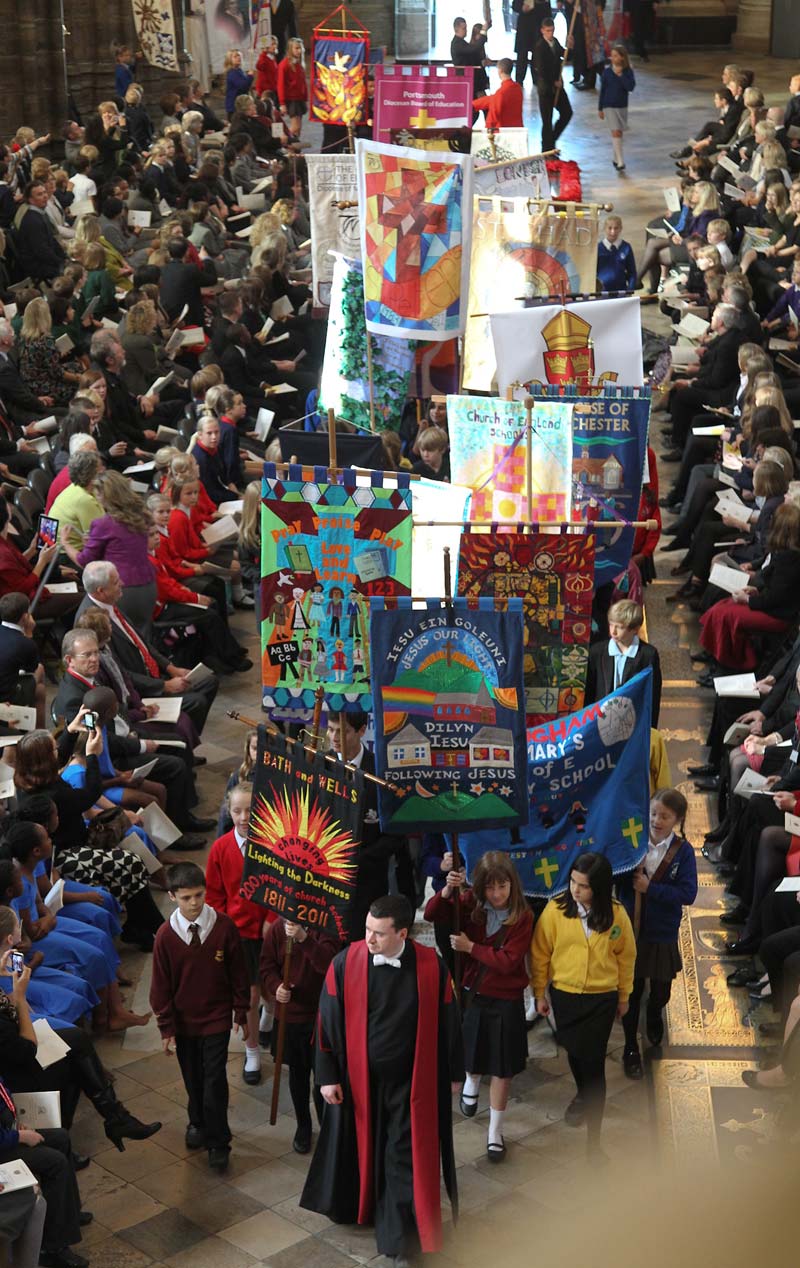Church schools provide “biggest possible picture” for good citizenship
 Photo: Andrew Dunsmore, Picture Partnership
Photo: Andrew Dunsmore, Picture PartnershipFriday 14th October 2011
The Archbishop of Canterbury, Dr Rowan Williams, preached today at Westminster Abbey in a service to celebrate 200 years of church schools.Dr Williams spoke of the importance of church schools in providing an environment for children to become good citizens. Preaching to a packed Westminster Abbey congregation of school children, teachers and church and education leaders, the Archbishop said that whether pupils were of the Christian faith or not church schools provided a vision for them “to see the biggest possible picture of humanity and the world they live in.” A transcript of the sermon appears below.
Church school children from across England and Wales carried specially-made banners to celebrate the founding of the Church of England's National Society in 1811 offering education to the poor in every parish - 50 years before the state joined in. The Archbishop praised the founders of the National Society who believed it was “inhuman and unjust” to send children up chimneys and down mines, and instead offered them an opportunity of education.
The Archbishop praised the founders of the National Society who believed it was “inhuman and unjust” to send children up chimneys and down mines, and instead offered them an opportunity of education.
In a Church of England podcast published today, the Revd Jan Ainsworth, Chief Education Officer for the Church of England, said it was important to celebrate the past while looking to opportunities in the future. “Our task is to make sure our church schools find a place within the new system and to bring other schools into relationship with us.”
The Choir of St Aidan’s School, Harrogate, dancers from Parish Church CE Junior School, Croydon, and performers from Manor CE School, York, all took a lead part in the service, conducted by the Dean of Westminster the Very Revd John Hall.

Photo: Andrew Dunsmore, Picture Partnership
Sermon
In most schools that I get to visit, and probably most schools that you know, there is somewhere a mysterious cupboard. You never know exactly what you're going to find in it, because that's the cupboard where things go when you can't think of anywhere else to put them. Quite often you find musical instruments in this cupboard, and because we've obviously got a lot of very good musicians here today, I want you to think of a cupboard in school where the musical instruments are kept.
Let's have a bit of science fiction to help us here. I want you to imagine an alien arriving at school very early in the morning before anybody else gets there. Using his sonic screwdriver, he opens the cupboard, and of course all kinds of things instantly fall out. He picks up one of them, and he looks at it, and thinks "Now what could this possibly be for? Maybe you drink from it, maybe you put it on your head, maybe you hang your washing from it?" And he sits there very, very puzzled for a long time.
The children arrive at school, and sooner or later somebody is sent to fetch something from the cupboard. And there in the cupboard, much to the surprise of whoever comes to find things, is a small green alien sitting on the floor looking very, very puzzled, and in front of him on the floor is the object he can't decide about.
Being a person of great presence of mind, the student who goes to the cupboard simply says, "Can I help you?" As you all know, a really good school is one in which that's the first thing you say to anybody you meet, even an alien in a broom cupboard.
"Well", says the alien, "I just cannot work out what this thing is for".
"Simple", says the student. "Come with me".
She picks up the thing, and the alien follows. Off they go to assembly, and the student hands the thing to somebody else and says, "Just show our visitor, would you, what we do with this". The other student picks up the thing, puts it to his lips, and blows into it - because it's actually a trumpet.
"Blow the trumpet in the new moon" said the words of the introit that we heard right at the beginning of this service. But if you found a trumpet (like the alien) and you'd never seen one before and you had absolutely no idea what to do with it, in order to find out what it was you'd have to see it being used. You'd have to see it, as we say, "in context". You could describe the trumpet until the cows come home, and you still wouldn't have worked out what it really was, what it was really for. What was just in front of your eyes wouldn't tell you everything - you'd need something more.
Sometimes we look, and do not see - we heard those words spoken a little while ago. We look and we don't see; we don't always grasp what something really is, what it's really for. And that's true of you and me, just as much as it's true of trumpets. You've got to see people in context. You've got to see them doing things, relating to one another. And if you're a Christian, you need to see them in relationship with God. You need somehow to see more than there is just in front of your eyes.
When you see another human being, what you're really seeing is just a big lump of bone and fat and hair. Some lumps bigger than others, some hair less than others, some fat more than others... well, you know. But of course we don't see people like that - we see them in context. We seem as people we can talk to and have friendships with. And if we're Christians, we see them in relationship with God. We see them as people that God wants to spend time with, that God wants to sit down and have a meal with, just as in the reading from the New Testament. When we look at one another as Christians, we see sitting next to us somebody that God is really interested in, and that God really wants to spend time with. And that changes really radically, once and for all, how we treat other people.
Now we believe that a church school - the kind of school that the National Society has been involved in for two centuries - is a place where you see people in context. You see them as people that God wants to spend time with. You don't just see the lump of bone and fat and hair. You don't just see the mysterious object that the alien finds in the cupboard, and wonder, "What's that for?" You know what your neighbour is for. You and your neighbour, your friends, the people involved all around you, are there for God. They're there for God to love, for God to make grow and flourish. And they're there for you to enjoy, and love, and be grateful for.
A church school is a place where you look and you see. Then the deceptions, the shadows, the ghosts, and the liars will fade away like mist on an autumn morning, and we will truly see - not just sometimes, but for all time. Being part of a community like this is being part of a community that is learning to see people properly, fully and richly; to see people in all their glory, and their surprisingness.
And I suppose it was this that was very much in the minds of the people who founded the National Society. Yes, they believed that the young people of this country needed to be educated; yes, they believed that it was somehow inhuman and unjust to send children into the mines and the farms and up chimneys and all the rest of it - because there is so much more to children than that. They looked at the children of this country, and they saw. It's such a tragedy, such a terrible judgement really, on the generations that went before that they had looked at so many children and never seen them, never seen what they really were, who they really were.
And the people who founded the National Society certainly wanted to educate children to be good citizens. They wanted them to grow up, as we were reminded right at the beginning of this service; they wanted them to grow up to have a voice in society, to be useful, creative members of the whole community. And so they gave them the skills that they might need to have a voice, to play a part in the wider community, because they knew something that we often forget these days. They knew that to be a good citizen of a country, really to play your part and have a voice in your society, you need to be more than just a good citizen. You need to have the biggest possible picture in your mind, the widest possible horizon. You need to see as much as you possibly can of other people, what they really are. You need to see how creative, how odd sometimes, how surprising, how wonderful they are. You need to see how God makes use of them, like musical instruments in a great worldwide universe-wide symphony.
Which is why in the first reading today, we had that great picture of the Lord in wisdom founding the earth, establishing the heavens. The widest possible horizon, the biggest possible picture. If we're getting a truly Christian education, that's the picture that's in our minds.
Not everybody in church schools has the same beliefs. You've probably noticed that, and you probably argue all the time about it. But the school is there simply to say: to grow up as a really creative, responsible person, a good citizen, then whether you believe the Christian faith in all its aspects or not, you need that big picture. You need the wide horizon, you need some sense of that great harmony of all creation, in which human beings fit. And above all, you need to see the person next to you as somebody that God wants to spend time with, just as Jesus after his resurrection wanted to spend time with his friends.
So what we're really saying thanks to God for today is 200 years of people learning to look and to see. Not just to see what's immediately in front of their noses, but to see into and through and around the people, the things of the world, to see them in the light of God. And by seeing them in the light of God, to discover astonishing possibilities. That's the vision out of which the National Society came, and that's why we have these schools, up and down the country, devoted to helping you and others to see. To look into the depths, to see the richness, to see the biggest possible picture of human beings and the world they live in. And by seeing that, to see something about yourself that helps you grow and be confident and be trustful and be loving, that helps you have a little bit of God in the way you behave.
The friends of Jesus in the New Testament story we heard, say to one another, "Didn't our hearts burn within us? Didn't we feel an astonishing sense of newness and possibility? Didn't we feel that the world was bigger than we ever suspected?" Their eyes had been opened, they'd seen something. And our prayer needs to be that in every church school up and down the country now, as over the last 200 years, people like you and me will be learning again and again to see. And to feel their hearts burning. Isn't the world an astonishing place? Aren't people remarkable? Isn't there so much more than I ever suspected to the world I live in?
And if we can learn that in our learning in school, we are indeed back to the introit of the service - singing merrily to God our strength, blowing the trumpet in the new moon. Learning what things are for, what people are for - how to make music to God that will draw to it all those in the world who need joy and hope and purpose.
In the name of the Father, and of the Son, and of the Holy Spirit, amen.
